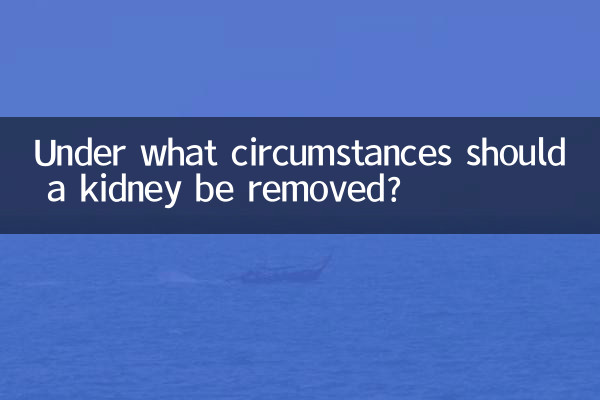Under what circumstances should a kidney be removed?
The kidneys are important excretory and metabolic organs in the body, but when certain diseases or injuries seriously threaten health, doctors may recommend removing the kidneys (nephrectomy). The following are kidney health topics that have been hotly discussed on the Internet in the past 10 days. Combined with medical guidelines, we will analyze common situations that require kidney removal.
1. Common reasons for kidney removal

| Reason | Description | Typical symptoms or diagnostic basis |
|---|---|---|
| kidney cancer | Malignant tumors invade kidney tissue and require surgical removal to prevent spread. | Hematuria, waist pain, and space-occupying lesions were found on imaging. |
| severe kidney injury | A car accident, a fall, etc. can cause a kidney to rupture beyond repair. | Severe abdominal pain, hemorrhagic shock, and CT scan showing kidney tear. |
| Chronic renal failure combined with infection | Loss of kidney function and repeated infections are life-threatening. | Elevated creatinine, uremic symptoms, and ineffective antibiotic treatment. |
| Polycystic kidney disease complications | Cysts that grow too large can cause bleeding, infection, or pressure on other organs. | Abdominal mass, high blood pressure, and rapid deterioration of kidney function. |
| Renal artery stenosis or embolism | Vascular disease leads to renal ischemic necrosis. | Sudden low back pain, anuria, and angiography confirmed the diagnosis. |
2. Common types of nephrectomy
| Surgery type | Applicable situations | recovery cycle |
|---|---|---|
| partial nephrectomy | Early renal cancer or local lesions retain some renal function. | 2-4 weeks |
| total nephrectomy | Complete loss of kidney function or advanced malignancy. | 4-6 weeks |
| Laparoscopic minimally invasive surgery | Suitable for most situations with minimal trauma. | 1-3 weeks |
3. Postoperative precautions
1.Monitor kidney function:After unilateral nephrectomy, the filtration capacity of the remaining kidney needs to be checked regularly.
2.Control your diet:A low-salt, low-protein diet reduces the burden on the kidneys.
3.To avoid infection:After surgery, your immunity will decline, so you need to pay attention to personal hygiene.
4.Follow-up review:Cancer patients need regular imaging tests to prevent recurrence.
4. Hot topics: kidney donation and transplantation
Recently, social platforms have been hotly discussing the safety of “living kidney donation”. Data show that after healthy people donate one kidney, the remaining kidney can maintain normal function through compensation, but they need to avoid strenuous exercise and high-load work for life.
Summary
Nephrectomy is necessary to treat severe kidney disease, but the indications for surgery need to be strictly evaluated. With the development of minimally invasive technology, patients' postoperative quality of life has significantly improved. If you or a family member is facing a similar situation, it is recommended to consult a urology specialist to develop a personalized plan.

check the details

check the details